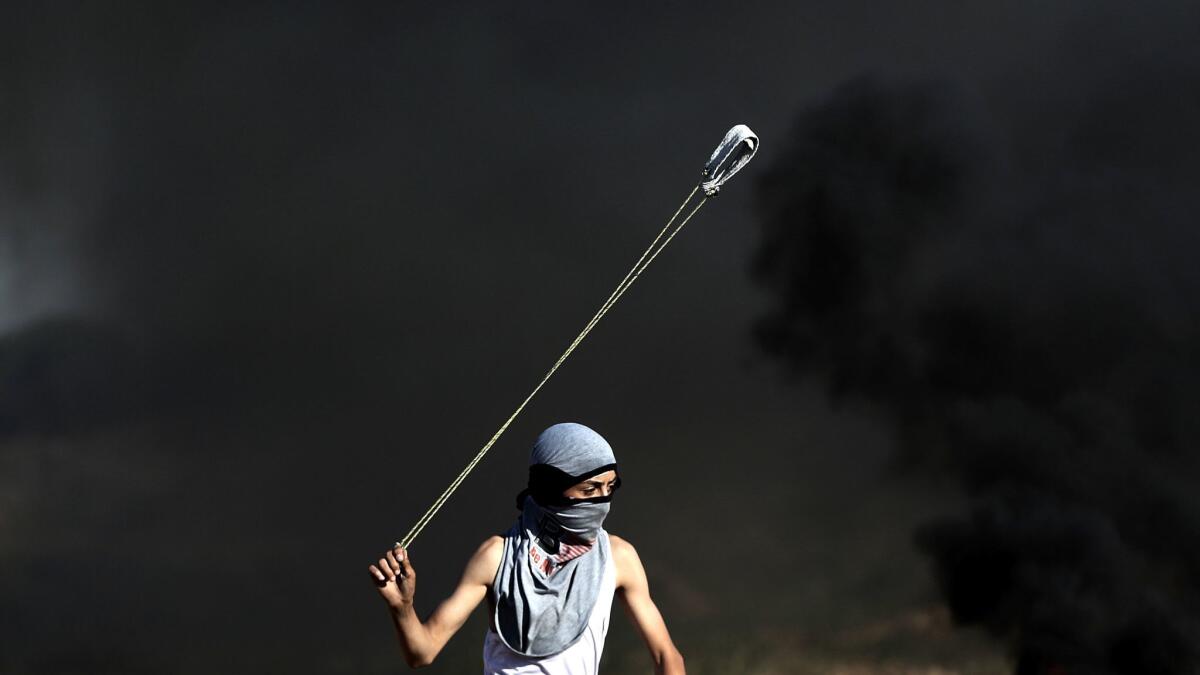Palestinian prisoners end six-week hunger strike after reaching deal

- Share via
Reporting from Tel Aviv — Hundreds of Palestinians jailed in Israeli prisons ended a 6-week-old hunger strike Saturday that raised tensions with Israel while marking the reemergence of a popular Palestinian politician serving multiple life terms for murder.
Led by Marwan Barghouti, a militant from the ruling Fatah party and a political rival to Palestinian Authority President Mahmoud Abbas, the strike included nearly 1,600 prisoners during the last month, making it the largest such prisoner demonstration in recent memory.
The hunger strike stirred grass-roots solidarity demonstrations throughout the West Bank and even garnered expressions of support from the rival Islamic faction Hamas. It ratcheted up popular pressure on Abbas during the visit of President Trump to the West Bank city of Bethlehem on May 23.
The end of the hunger strike comes on the eve of the Muslim observance of the holy month of Ramadan, a period of daily fasting which could have further endangered the health of the participants. A death among the protesting prisoners was likely to have fanned demonstrations and risked turmoil with Israeli forces in the West Bank.
Hundreds of Palestinians clapped and danced to festive music in the West Bank city of Ramallah on Saturday as leaders of the prisoners’ campaign declared that the striking inmates had “prevailed” over Israel by forcing the prison authorities to negotiate on the conditions for some 6,300 Palestinians in Israeli jails.
Following talks between Israel, the prisoner leadership and the International Red Cross, the sides agreed to increase the frequency of family visits for the inmates.
“This is an important step towards full respect of the rights of Palestinian prisoners under international law,’’ the Free Marwan Barghouti campaign said in a released statement.
The United Nations Special Coordinator for the Middle East Peace Process, Nickolay Mladenov, welcomed the agreement, and, in a statement, urged the sides to “avoid similar heightened tensions in the future.”
A spokeswoman for the Israel Prison Service confirmed the agreement, but denied the strike had forced the authorities to negotiate over conditions in the jails with the prisoner representatives.
According to the prison service, nearly 1,600 Palestinians prisoners participated at one time or another during the strike. By the end of strike, some 850 were still participating.
Palestinian political analysts said the strike was a boost for Barghouti, who is seen as leading candidate to succeed Abbas at a time of widespread speculation about who will come after the 82-year old Palestinian president.
The strike began in mid-April, with an op-ed in the New York Times penned by Barghouti, who protested “ill-treatment of Palestinian prisoners.’’ Midway through the hunger strike, Israeli authorities made public a video purporting to show Barghouti in his prison cell eating a candy bar. Palestinians challenged the authenticity of the video, which actually helped boost support for Barghouti and the hunger strikers.
Barghouti, who was jailed by Israel in 2002 at the height of a campaign of Palestinian suicide bombings and shooting attacks in Israeli cities, is seen by some as a potential peacemaker because of grassroots appeal among Palestinians and his support for negotiations with Israel. In 2004, he was convicted by a Tel Aviv district court of murder in three attacks that left five dead. He was also convicted of being a member of a terrorist group. Years of opinion polls show him as the most popular Palestinian politician.
Though the Palestinian Authority backed the strike, the prisoners’ demonstration put Abbas in an awkward position among Palestinians, many of whom believed that his government didn’t do enough to support the strike.
As Abbas met with Trump, Palestinians observed a commercial strike and held public demonstrations in solidarity with the prisoners.
According to a May public opinion survey by the Arab World for Research and Development group, some two-thirds of respondents said they were dissatisfied with the response of Abbas to the strike.
“There is a narrative being drawn up that this is a victory, so it is a victory,” said Daoud Kuttab, a Palestinian political analyst based in Amman. “There is a perception this is a victory for the prisoners, and for Marwan [Barghouti], because he embarked on a strike the Palestinian Authority wasn’t that excited about.’’
Mitnick is a special correspondent.
More to Read
Sign up for Essential California
The most important California stories and recommendations in your inbox every morning.
You may occasionally receive promotional content from the Los Angeles Times.










